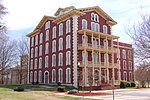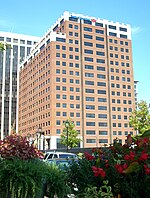Duke Energy Center for the Performing Arts

Martin Marietta Center for the Performing Arts is the premier location for cultural arts and entertainment in Raleigh, North Carolina. The center consists of four unique venues, Raleigh Memorial Auditorium, Meymandi Concert Hall, A.J. Fletcher Opera Theater, and Kennedy Theatre. The Martin Marietta Center for the Performing Arts hosts national tours and performers, and is also home to five resident companies; Carolina Ballet, NC Opera, NC Symphony, NC Theatre, and PineCone. Hosting over 600 events each year and welcoming over 400,000 guests, the Martin Marietta Center is a cultural focal point in downtown Raleigh. The naming rights to the center currently are held by Martin Marietta. The building naming rights were previously held by Duke Energy (formerly Progress Energy), and by Business Telecom, Inc. (now EarthLink).The center consists of: Raleigh Memorial Auditorium (opened 1932, renovated 1990) Meymandi Concert Hall (opened 2001) A. J. Fletcher Opera Theater (opened 2001) Kennedy Theatre (opened 2001) Lichtin Plaza (opened 2001)
Excerpt from the Wikipedia article Duke Energy Center for the Performing Arts (License: CC BY-SA 3.0, Authors, Images).Duke Energy Center for the Performing Arts
East South Street, Raleigh Warehouse District
Geographical coordinates (GPS) Address Website Nearby Places Show on map
Geographical coordinates (GPS)
| Latitude | Longitude |
|---|---|
| N 35.771325 ° | E -78.639483 ° |
Address
Martin Marietta Center for the Performing Arts
East South Street 2
27601 Raleigh, Warehouse District
North Carolina, United States
Open on Google Maps








